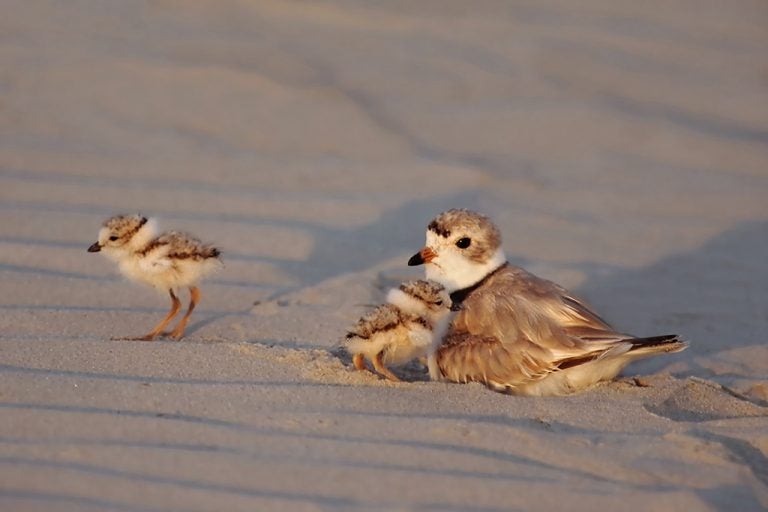Endangered birds force buggy access closure on N.J. beach
New Jersey officials will soon temporarily prohibit beach buggy access in a portion of Island Beach State Park due to the presence of a nesting endangered shorebird.

Piping plover with chicks in Cape May, N.J. (Courtesy of Kevin Karlson)
New Jersey officials will soon temporarily prohibit beach buggy access in a portion of Island Beach State Park due to the presence of a nesting threatened and endangered shorebird.
Beginning May 26, officials will prohibit vehicle access at the Gillikin’s Mobile Sportfishing Vehicle entrance in the Northern Natural Area to protect piping plovers, according to a Department of Environmental Protection news release.
State officials said five miles of beach will remain open for beach buggies.
The closure is required under federal law. Unless otherwise posted, foot traffic is permitted, but no dogs will be allowed in the closed area north of the Gillikin’s entrance beginning May 24.
Symbolic fencing, primarily twine or rope strung on poles, is provided to help people identify sensitive areas from a distance.
Due to the closure, the state park could reach capacity for beach buggies sooner than normal, requiring officials to temporarily halt access.
“We appreciate your cooperation in ensuring the next generation of New Jersey’s shorebirds has a safe and successful start on our beach,” the release said.
Piping plovers have nested in Island Beach State Park over recents summers, beginning in 2016. Before that, they were last spotted in the state park in 1989. Conserve Wildlife Foundation of New Jersey biologists speculate that Superstorm Sandy’s creation of more open habitat was probably responsible for the piping plover return to Island Beach State Park.
Over three-quarters of New Jersey’s piping plover population is found at Sandy Hook and the Edwin B. Forsythe National Wildlife Refuge, according to the Conserve Wildlife Foundation of New Jersey
New Jersey has seen a steady decline in the number of piping plovers nesting along the state’s 130 miles of beach. Last year, just 96 nesting pairs were counted along the length of the state, said John Heilferty, the acting chief of the Endangered and Non-Game Species Program under the DEP’s Division of Fish and Wildlife.
Of those, two nesting pairs were in the North Brigantine natural area. Both succeeded in chicks that survived long enough to fly away on their own.
State officials have acknowledged that red foxes have been trapped and killed to reduce their impact on endangered and threatened birds that nest on the beach, most notably the piping plover.
Bill Barlow contributed to this report.
WHYY is your source for fact-based, in-depth journalism and information. As a nonprofit organization, we rely on financial support from readers like you. Please give today.




